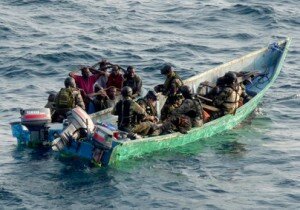Pirates drama a sequel to ‘Black Hawk Down’

This photo, released Jan. 28, 2009 by the French Defense ministry, shows suspected pirates intercepted by Marine commandos of the French Navy in the Gulf of Aden, off Somalia's coast, on Jan. 27. The target was reported to be the Indian cargo ship "African Ruby".
Toronto Star — Seen from the vantage point of arid America, the high-seas kidnapping and rescue of freighter Capt. Richard Phillips is a movie missing a beginning and end. All but lost in the scripted-for-Hollywood drama is the historical thread that connects the rise of piracy to the fall of Somalia, a country both the U.S. and Canada tried and failed to save from itself.
As much as piracy is a scourge and a threat to one of the world’s busiest ocean routes, it’s not the root problem. Dangerous and disruptive, it’s merely a manifestation of what happens when flimsy governments implode and no one else has the will, capacity or patience to help pick up the pieces.
Washington and Ottawa tried to restore order to Somalia in 1992. Both were so badly scarred by the experience that neither has much enthusiasm for returning to Africa even when the need, as it is in Darfur, is self-evident and urgent.
In the U.S., Somalia is synonymous with Black Hawk Down, the events, book and film that became a metaphor for a superpower’s inability to cope with chaos and warlords. In Canada, it is remembered for the shameful beating death of a looting Somali teenager that challenged public perceptions of the military as Boy Scout peacekeepers and led to the disgrace and disbandment of the Airborne Regiment.
Erasing those memories is as difficult as it would be foolish not to learn from Western hubris and military mistakes. But it is equally obvious that leaving the world’s Somalias to sort themselves out is not in anyone’s interest or a sustainable option.
Failed states provide more than safe haven for pirates. While the U.S., Canada and their allies concentrate on Afghanistan, Osama bin Laden and his disciples are sinking roots deeper into east and north Africa’s Islamic communities. From the continent’s famous Horn across the Sahara to where Canadian diplomats Robert Fowler and Louis Guay are held by one of its loose affiliates, Al Qaeda is burrowing deeper into states too hollowed out to sustain social and civil order let alone provide basic services or national security.
One result is a for-profit threat to travellers, foreign workers and international trade. That’s the case beyond Somalia’s wild seaboard to Africa’s west coast where piracy, particularly off Nigeria, has long been a boom business, and along the modern caravan routes that carry extreme tourists north to south.
Another result is the broader menace that failed and failing states pose to the world community. From the long-range delivery of terror to the export of narcotics, they present risks that demand but have yet to produce equally powerful countervailing reactions.
Sunday’s rescue was heart-warming. Yesterday’s Barack Obama rhetorical resolve to get tough on piracy is encouraging. Neither should be mistaken for a solution. Countering thugs with force and making sea lanes safe for shipping are but small parts of the very long, usually bloody and always expensive effort to ensure fragile states, from the Americas to Africa and Asia, have the strength to control their borders and contain crime.
Even though criteria differ, there’s no doubt the scale of the challenge dwarfs even that of the current financial crisis. It requires equally determined, co-ordinated and innovative responses. Without them, anarchy will flourish in power vacuums, constantly catching the unprepared by surprise.
This week, America is seeing that movie one more time. All it needs now is to remember the context.
James Travers’ column appears Tuesday, Thursday and Saturday.
Comments
comments
 Calendar
Calendar



































